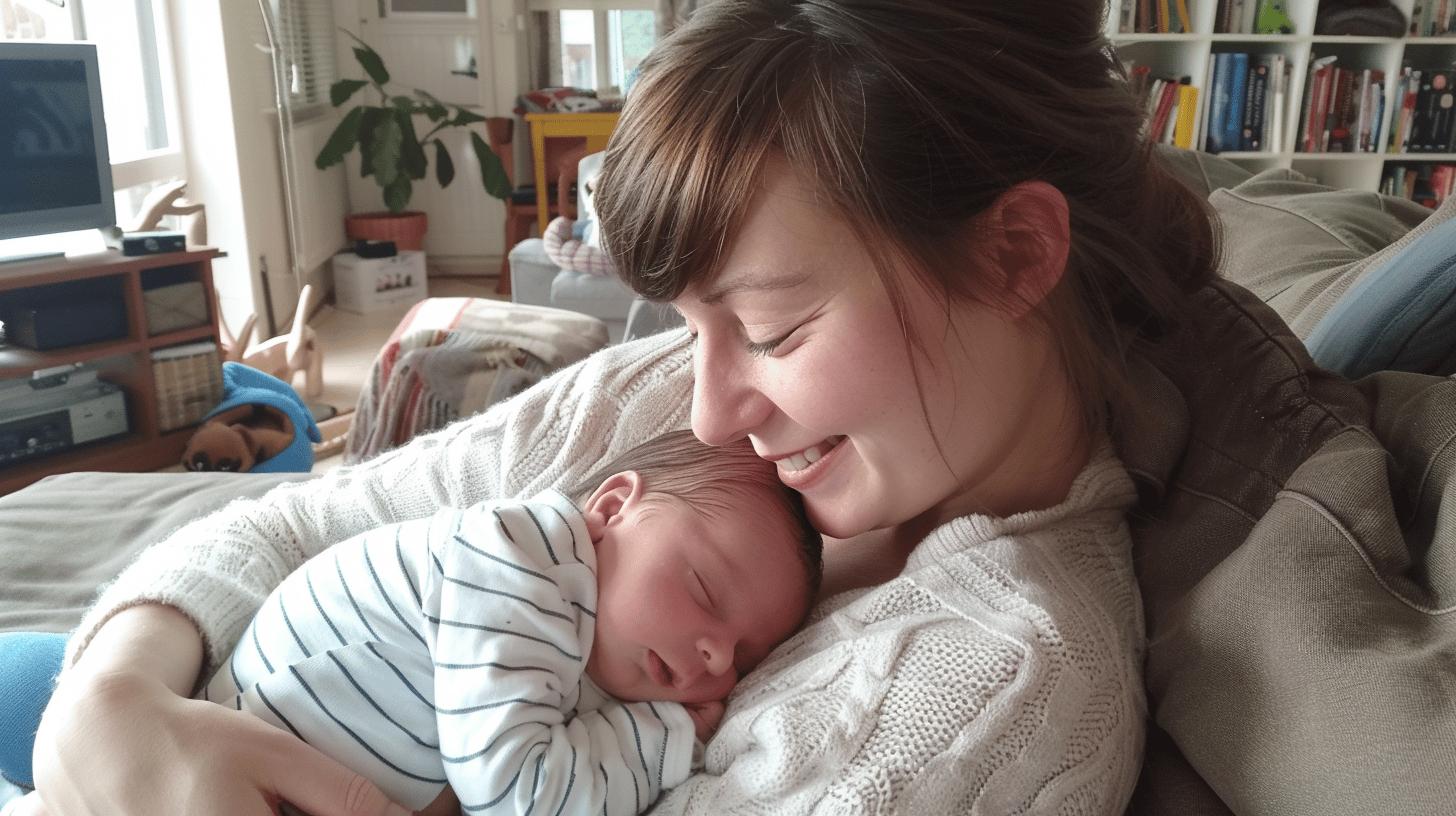Ever wondered why parenting feels like a never-ending roller coaster ride? Parenting is much more than simply raising a child; it's a journey filled with complex stages that evolve alongside your child's growth. In "4 Stages of Parenting: A Journey Through Life," we dive deep into these transformative phases, from preparing for parenthood to navigating the teenage years. You'll explore practical strategies and emotional insights to help you thrive in each stage. Ready to decode the beautiful chaos of parenting? Let's embark on this journey together.
The Image-Making Stage: Preparing for Parenthood
During pregnancy, parents begin to visualize their future life with the child, forming emotional bonds and managing expectations. This emotional preparation involves imagining daily routines, considering how parenthood will change their lives, and discussing hopes and dreams for their baby's future. Establishing a strong emotional connection helps parents navigate the challenges ahead and fosters a nurturing environment.
Practical preparation is equally important. Setting up a nursery, understanding the childbirth process, and planning parental roles are essential steps. Parents often attend childbirth classes, read parenting books, and organize their homes to ensure a safe and comfortable space for the newborn. These actions help parents feel more confident and ready to welcome their baby into the world.
- Choose a pediatrician and schedule initial appointments.
- Attend prenatal classes to learn about childbirth and newborn care.
- Set up a nursery with all necessary supplies.
- Discuss and plan parental roles and responsibilities.
- Prepare for the hospital stay, including packing a hospital bag.
The Nurturing Stage: Infancy (0-2 Years)

Infancy, spanning the first two years of life, is characterized by rapid physical growth, cognitive development, and emotional bonding. During this nurturing stage, babies experience significant milestones such as rolling over, sitting up, and taking their first steps. Cognitive development includes recognizing faces, responding to sounds, and beginning to understand simple words. Emotional bonding is fostered through consistent and loving care, which helps establish trust between the baby and the parents.
One of the primary challenges during this stage is sleep deprivation, which can affect a parent's ability to function effectively. Feeding issues, such as breastfeeding difficulties or introducing solid foods, also present hurdles. Additionally, maintaining self-care can be challenging as parents adapt to the baby's unpredictable schedule. Balancing these demands requires patience and resilience.
To navigate this stage successfully, parents can adopt several key strategies. Establishing routines for sleep, feeding, and playtime helps create a sense of security for the baby. Fostering a secure attachment involves responding to the baby's needs promptly and consistently, which builds trust. Seeking support from family, friends, or parenting groups can provide emotional relief and practical advice. These strategies not only benefit the baby's development but also support the parents' well-being.
<6-8 weeks>
<4-6 months>
<6-8 months>
<10-12 months>
<12-18 months>
The Training Stage: Early Childhood (3-7 Years)
Developmental Milestones
During early childhood, children experience significant physical, cognitive, and social development. Physically, they improve their motor skills, coordination, and balance. This period sees children running, jumping, and refining their hand-eye coordination. Cognitively, they start to develop problem-solving skills, understand cause and effect, and enhance their memory. Socially, they learn to interact with peers, share, and take turns, which are crucial for building relationships.
Parenting Challenges and Tips
Managing tantrums is one of the primary challenges during this stage. Tantrums are often a result of frustration or an inability to express emotions verbally. To handle tantrums effectively, parents can stay calm, acknowledge their child's feelings, and offer comfort. Encouraging positive behavior involves setting clear expectations, using positive reinforcement, and modeling appropriate behavior. Consistency in rules and consequences helps children understand boundaries.
To foster independence, parents should gradually allow children to take on more responsibilities. This includes letting them make simple choices, encouraging self-help skills like dressing and feeding, and praising their efforts. Building a sense of independence boosts a child's confidence and prepares them for future challenges.
- Teach children to dress themselves.
- Encourage participation in household chores like setting the table.
- Foster good hygiene habits such as brushing teeth and washing hands.
- Help them learn to follow simple instructions.
- Support social skills development by arranging playdates.
- Introduce basic problem-solving skills through age-appropriate activities.
The Coaching Stage: Middle Childhood (8-12 Years)

During middle childhood, children develop more complex social and academic skills. Socially, they learn to navigate friendships, understand social cues, and cooperate with peers. Academically, they build foundational knowledge in subjects like math, reading, and science. Emotional regulation becomes more sophisticated as they learn to manage their feelings and develop empathy. These milestones are crucial for their overall development and future success.
Parents play a critical role in guiding their children through this stage. Supporting school performance involves maintaining regular communication with teachers, helping with homework, and fostering a positive attitude towards learning. Encouraging extracurricular activities allows children to explore their interests, develop new skills, and build self-esteem. Fostering peer relationships can be achieved by arranging playdates, teaching conflict resolution skills, and modeling respectful behavior.
Balancing support and independence is one of the primary challenges during the coaching stage. Parents need to provide guidance without being overbearing. Dealing with learning difficulties requires patience, open communication with educators, and seeking additional resources when necessary. Maintaining open communication involves listening actively, validating their feelings, and creating a safe space for discussions. These strategies help children feel supported and confident as they navigate this stage.
The Mentorship Stage: Adolescence (13-18 Years)
Developmental Milestones
Adolescence is a critical period marked by significant developmental milestones. Teenagers work on forming their own identities, which involves exploring different roles, beliefs, and experiences. Emotional regulation becomes more sophisticated as they learn to manage complex feelings and stress. Cognitive development also advances, with improvements in abstract thinking, problem-solving, and decision-making skills. These milestones are essential for their transition to adulthood.
Parenting Techniques and Conflict Resolution
During the mentorship stage, parents must adjust their approach to offer guidance while respecting their teenager's growing need for independence. Effective communication is key; parents should listen actively, validate feelings, and maintain open dialogues. Supporting mental health involves recognizing signs of stress or anxiety and encouraging healthy coping mechanisms. Conflict resolution strategies include setting clear boundaries, being consistent with rules, and involving teenagers in decision-making processes. By doing so, parents can help their teens develop responsibility and self-discipline.
- Encourage open and honest communication.
- Support their interests and hobbies.
- Teach financial literacy and budgeting.
- Foster critical thinking and decision-making skills.
- Promote healthy lifestyle choices, including diet and exercise.
The Friendship Stage: Young Adulthood (19+ Years)

In the friendship stage of young adulthood, parents transition from being authority figures to supportive friends. This shift in parental roles involves providing guidance when asked, respecting the young adult's independence, and offering support during significant life decisions such as career choices, relationships, and major financial commitments. The key is to be available without being overbearing, allowing young adults to learn from their experiences while knowing they have a safety net.
Maintaining a healthy relationship during this stage requires effective communication, mutual respect, and emotional support. Parents should engage in open, honest conversations, listen without judgment, and respect their young adult's opinions and choices. Emotional support is crucial, especially during challenging times, as it reinforces the bond and strengthens trust. By fostering an environment of respect and understanding, parents can build a lasting and meaningful relationship with their young adult children.
- Encourage open and honest communication.
- Respect their independence and decision-making.
- Offer guidance and support when asked.
- Provide emotional support during challenging times.
Final Words
In the action of parenting, the 4 stages of parenting unfold uniquely, each with its own challenges and strategies. From preparing during pregnancy to providing intense care in infancy, parents adapt and grow.
In early childhood, they set boundaries and foster independence, while during middle childhood, they balance support with autonomy. Adolescence brings the mentorship role, guiding teens through identity formation and conflict resolution. Finally, young adulthood transitions parents into a supportive friendship role.
Through each of these stages, the journey is rewarding, shaping both parent and child for a healthy and happy future.
FAQ
What are the 4 stages of parenting?
The four stages of parenting include the Image-Making Stage, the Nurturing Stage, the Training Stage, and the Coaching Stage. Each stage focuses on different aspects of child development and parenting techniques.
What are the 4 steps of parenting?
The four steps of parenting broadly cover emotional and practical preparation during pregnancy, meeting basic needs in infancy, supporting learning in early childhood, and guiding through middle childhood.
What are the 4 C's of parenting?
The 4 C's of parenting are Care, Consistency, Control, and Communication. These principles help parents provide a stable and nurturing environment.
What are the 4 stages of fatherhood?
The four stages of fatherhood align with the stages of parenting: Image-Making, Nurturing, Training, and Coaching. Fathers, like mothers, adapt their roles as children grow.
What are the stages of the parent-child relationship?
The stages of the parent-child relationship evolve from nurturing in infancy, guiding in early childhood, coaching in middle childhood, to mentoring in adolescence.
What are the four major parenting styles?
The four major parenting styles are Authoritative, Authoritarian, Permissive, and Uninvolved. Each style has different impacts on child development and behavior.


